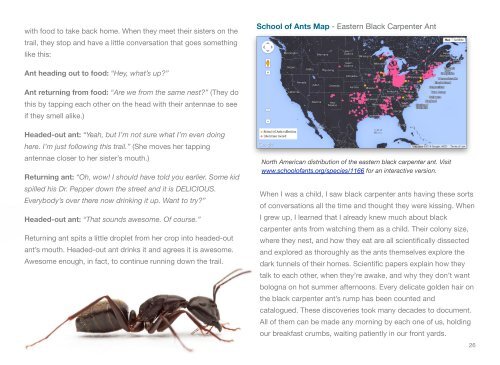th15IH
th15IH
th15IH
Create successful ePaper yourself
Turn your PDF publications into a flip-book with our unique Google optimized e-Paper software.
with food to take back home. When they meet their sisters on the<br />
trail, they stop and have a little conversation that goes something<br />
like this:<br />
School of Ants Map - Eastern Black Carpenter Ant<br />
Ant heading out to food: “Hey, what’s up?”<br />
Ant returning from food: “Are we from the same nest?” (They do<br />
this by tapping each other on the head with their antennae to see<br />
if they smell alike.)<br />
Headed-out ant: “Yeah, but I’m not sure what I’m even doing<br />
here. I’m just following this trail.” (She moves her tapping<br />
antennae closer to her sister’s mouth.)<br />
Returning ant: “Oh, wow! I should have told you earlier. Some kid<br />
spilled his Dr. Pepper down the street and it is DELICIOUS.<br />
Everybody’s over there now drinking it up. Want to try?”<br />
Headed-out ant: “That sounds awesome. Of course.”<br />
Returning ant spits a little droplet from her crop into headed-out<br />
ant’s mouth. Headed-out ant drinks it and agrees it is awesome.<br />
Awesome enough, in fact, to continue running down the trail.<br />
North American distribution of the eastern black carpenter ant. Visit<br />
www.schoolofants.org/species/1166 for an interactive version.<br />
When I was a child, I saw black carpenter ants having these sorts<br />
of conversations all the time and thought they were kissing. When<br />
I grew up, I learned that I already knew much about black<br />
carpenter ants from watching them as a child. Their colony size,<br />
where they nest, and how they eat are all scientifically dissected<br />
and explored as thoroughly as the ants themselves explore the<br />
dark tunnels of their homes. Scientific papers explain how they<br />
talk to each other, when they’re awake, and why they don’t want<br />
bologna on hot summer afternoons. Every delicate golden hair on<br />
the black carpenter ant’s rump has been counted and<br />
catalogued. These discoveries took many decades to document.<br />
All of them can be made any morning by each one of us, holding<br />
our breakfast crumbs, waiting patiently in our front yards.<br />
26


